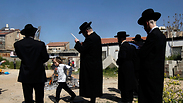
'Religious public demanding endless consideration for its faith system in the name of tradition'
צילום: רויטרס
The coercing presence of religion in Israel
Op-ed: Israel's public domain gives clear preference to sensitivities of one group, Orthodox Judaism, at expense of all others.
During the intermediate days of the Passover holiday, I delivered a lecture in Jerusalem to a group of students from the University of Chicago. At the end of the lecture, I asked them what had left the strongest impression on them in Israel.
Much to my surprise, they did not mention the holy sites, and not even the Israeli-Palestinian conflict. Most of them showed little interest in politics and they accepted the roadblocks they encountered as an inevitable part of the way of the world, just like the queues and the demand to take off their shoes and remove their belts during the airport security check.
What surprised them was the fact that the State of Israel bans leavened foods sales during Passover. In fact, they were surprised by the significant, coercing presence of religion in the public domain in the Jewish democratic state: Phenomena such as the absence of public transportation on Saturdays and the shutting down of businesses under the Shabbat Law.
Some of the students were devout Christians, people for whom religion plays an important role in their private life. But in the United States, they said, religiosity is the business of the individual and the voluntary community (a community which has willingly accepted certain behavioral norms). The public domain – which is occupied by an audience of all types, races and religious faiths – is in most Western countries a neutral space where everyone is supposed to feel at home. No one, let alone a state, has the right to force one faith – even if it is the majority's faith – on all people.
This perception of the public domain does not exist in Israel. The public domain in Israel is a domain in which clear preference is given to the sensitivities of one group, Orthodox Judaism, at the expense of all others. This is manifested in a particularly blatant manner in the Festival of Matzot (Prohibition of Leaven) Law enacted in 1986.
This law determines that "during the Passover holiday, a business owner will not display a chametz (leavened) product in public for sale or consumption." The law does not prohibit, thank God, the private consumption of chametz in the private domain, but in the public domain it "must not be seen and must not be found."
It's true that in 2008 Judge Tamar Bar-Asher-Zaban ruled that a store and a restaurant are not a public place and that the law only applies to the display of chametz in a "public" place, but the judge did not dare challenge the actual principle.
Where will it end?
In the State of Israel a person is not allowed to set up a pita bread stand in public during Passover, even if he is secular. In fact, he is not allowed to set up a pita bread stand in public even if he is not Jewish. In the recent holiday, Jerusalem Municipality inspectors removed dozens of stands selling chametz around the Jaffa Gate. Why? So as not to hurt religious people's feelings.We should remember, by the way, that the IDF ensure that the dogs in its canine unite – including Canaan dogs and German shepherds – will not eat chametz. It's all about sensitivity.
We Israelis have gotten so used to this reality that it seems normal to us. We should pay attention that this is not about religious citizens being forced, God forbid, to do something which is against their conscience. This is about the authorities of an allegedly secular and democratic state engaging in the voluntary religionization (the opposite of secularization) of the public domain.
This religionization is being done in the name of the huge sensitivity of the religious public, which is demanding in the name of tradition and in the name of the nation (as it sees itself as responsible for them and as their definer) endless consideration for its faith system.
There are other things the religious public finds difficult to tolerate: For example, public transportation on Shabbat and on Jewish holidays. This is not about forcing religious people to violate Shabbat, God forbid, but the suffering inflicted on the religious by seeing other people violate it requires the State's intervention. Later on, it will be the turn of women's singing and commercials with women and women's clothing in public.
If you accept the principle, don't be surprised if you're asked to consider the religious sensitivity in other fields. If you don't agree, you'll go to jail. Wouldn't you go to great lengths for the sake of unity among our people?










